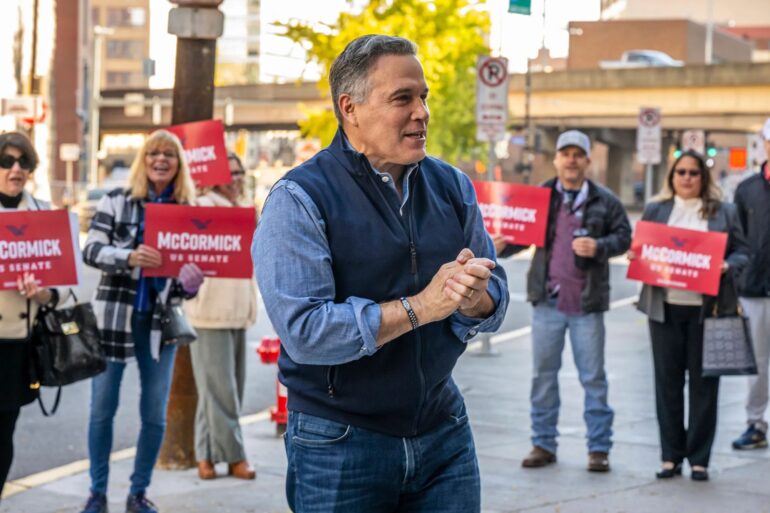🔴 Website 👉 https://u-s-news.com/
Telegram 👉 https://t.me/usnewscom_channel
An old dog might not be able to learn new tricks, but the Grand Old Party can.
Or then again, maybe it finally remembered a long-forgotten truth: Normal Republicans win elections.
Back-to-back losses to Barack Obama — followed by Donald Trump’s upset victory over Hillary Clinton — had a somewhat deranging effect on the GOP.
The particulars, namely that Obama and Trump were unique political talents and Clinton was a unique dud, didn’t seem to matter to Republicans.
Instead, its primary voters seemed to conclude that the path to victory would require the most bombastic, controversial candidates the party could find.
This electoral theory died a painful death in 2022, when the red wave widely anticipated by most observers barely amounted to a ripple.
Despite President Biden’s unpopularity, Republicans floundered.
They all but forfeited two winnable gubernatorial races, were barely able to take back the House of Representatives and actually managed to lose ground in the Senate.
Why? Because so many of their most high-profile candidates resembled caricatures, rather than the kind of well-rounded people voters could envision themselves grabbing beers with.
Passion is appealing, but monomania is not.
Pennsylvania’s GOP nominee for governor, Doug Mastriano, was on US Capitol grounds during the Jan. 6 riot.
If Kari Lake, Mastriano’s counterpart in Arizona, had any regret about the events of that day, it seemed to be that she wasn’t there, too.
The unrelatable US Senate candidates accompanying them on the ballot, Mehmet Oz and Blake Masters, were hand-picked by Trump and billionaire Peter Thiel for petty personal reasons, not political competency.
New Hampshire’s Don Bolduc parroted stolen-election conspiracy theories to win his primary, then blamed his general election loss on those same accusations.
And Georgia’s legendary football star Herschel Walker couldn’t run away from a past that was an opposition researcher’s dream.
Result: one of the most disappointing midterm performances an opposition party has had in recent memory.
One that had very serious consequences. The ultra-thin GOP House majority allowed small factions to force two embarrassing misadventures to crown a speaker, upending the Republicans’ legislative agenda.
And in the Senate, Chuck Schumer successfully pushed through even the most extreme of Biden’s judicial nominees.
But the sting of defeat helped Republicans learn a valuable lesson.
This time around, they didn’t want to be left with the same regrets.
While the battle for the House remains a toss-up, Republicans are poised to finally take back the upper chamber— largely due to the much-improved quality of their candidates.
This year’s crop presents as a collection of citizens who want to serve their country, rather than political obsessives grinding niche axes.
Think of the neighbor who shovels your sidewalk or mows your lawn while you’re on vacation, and not the one who corners you into uncomfortable conversations.
Deep-red Montana may at last rid itself of its Democratic Sen. John Tester, thanks to Trump’s decision to crush the candidacy of proven loser Matt Rosendale in its crib and endorse Tim Sheehy.
Pennsylvanians also corrected their mistake from last time around and nominated Dave McCormick to challenge longtime incumbent Sen. Bob Casey.
Both Sheehy and McCormick served their country in uniform, enjoyed successful careers in business and are campaigning on the issues that affect voters directly.
In Michigan and Wisconsin, Mike Rogers and Eric Hovde are also nipping at their opponents’ heels with substantive, localized campaigns.
In fact, the GOP’s candidates across the Rust Belt are doing so well that each of their Democrat opponents has felt compelled to run ads touting their strong relationships with Trump.
Maryland’s Larry Hogan is no conservative, but he’s exactly the kind of Republican — indeed, maybe the only one — who could win in such a blue state.
Similarly, New Hampshire gubernatorial candidate Kelly Ayotte has already demonstrated her ability to win statewide.
And in Ohio and Nevada, Republicans Bernie Moreno and Sam Brown are running competitive races that were once thought to be hopeless against entrenched Democratic incumbents.
Even if they don’t ultimately prevail, they’ll have forced the Democrats to use valuable resources playing defense where they never expected they’d need to.
To be sure, there are still some clunkers:
Lake is on Arizona’s ballot again, this time for the US Senate, and North Carolina gubernatorial candidate Mark Robinson has treated us to what must be the nation’s first-ever “Black Nazi” porn scandal. (Robinson denies the allegations.)
But by and large, primary voters — and Trump — chose wisely this cycle, and are in pole position as a result.
Regardless of the results, Republicans would be smart to apply the same logic to future contests.
They need not nominate establishment squishes or Trump detractors.
But they must reject the flakes and sycophants who can offer them only lies — and defeat.
Isaac Schorr is a staff writer at Mediaite.
